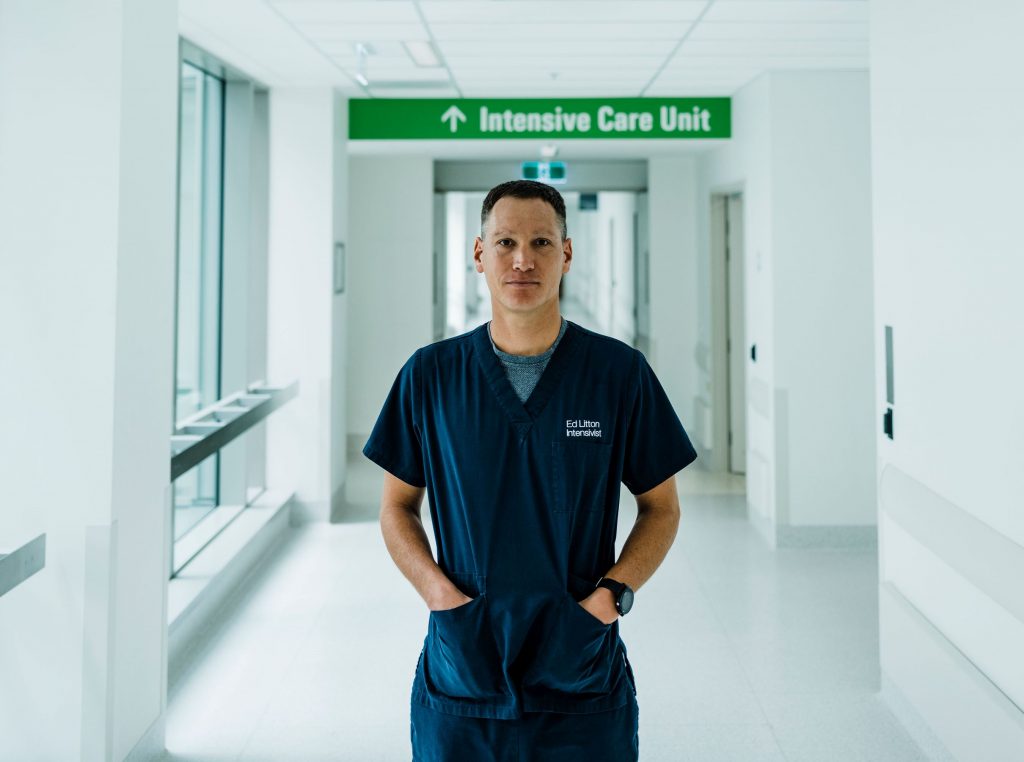Ed's Story
“Over 150,000 Australians a year are admitted to an intensive care unit. So continuing to foster the best and the brightest is critically important.” Dr Ed Litton, Head of ICU Research, Fiona Stanley Hospital.

“Over 150,000 Australians a year are admitted to an intensive care unit. So continuing to foster the best and the brightest is critically important.” Dr Ed Litton, Head of ICU Research, Fiona Stanley Hospital.

Liam Gallagher, the foppish, foul-mouthed bad boy of Brit pop, lured Ed Litton to London. That, and an aversion to law.
That’s not to say Ed was a naughty boy — he just had no interest in following in his judge father’s footsteps. Though he could recite law by rote from an early age, he never imagined himself in a stale courtroom. “I definitely didn’t want to have anything to do with law,” he says. Science is awesome, it’s how we unlock the future. It’s just cool! I always wanted to do medicine.”
Ed left his native Hong Kong as a teenager, heading to the UK with mates to study — and, hopefully, hang out with Oasis. Though he never did track down a Gallagher he did graduate, and spent a year working in emergency before taking off travelling — including a stint volunteering in Borneo — before landing in Western Australia.
The young doctor always wanted to work in critical care, and is now the enormously disciplined and passionate head of Fiona Stanley’s Intensive Care Research Unit. It is a specialty full of mystery, accepted wisdom and enormous potential.
“There’s so much more that we don’t know than we do,” he says.
“In fact a lot of the treatments that are part of our standard practice, we don’t know whether they’re beneficial or not. And that would come as a surprise I imagine to the public. A lot of what we do is just based on historical norms, not high-quality evidence, which you can only get from research.”
Ed is an ardent researcher, determined to ask questions and to do better.
“You quickly, in intensive care, hit this limit of knowledge that you can’t get past. I get comfort when I think that at least I’m involved in the process of trying to address that because what’s the alternative? That you’re just comfortable with a lack of knowledge? That you can’t do better for the next patient than you’re doing for the one at the moment? So it’s the only way to be.”

A particular focus for Ed is quite simple but absolutely crucial: sleep.
“I’m told there is a danger of bringing your personal issues into your research and as the father of three young kids sleep is a personal as well as a research issue,” he says with a chuckle.
“That having been said … there is a huge amount of evidence outside of intensive care and mounting that sleep quality has profound impacts on long-term health outcomes — that chronic sleep deprivation is really bad for us.”
Yet in intensive care, when patients are at their most vulnerable, sleep is hard to come by. “And actually when you look at what people who’ve experience ICU say, a recurring theme is that the sleep deprivation was a major issue for them and not only was it an issue in ICU, it then continues to be an issue after ICU discharge — not just on the ward but then still when they go home.”
Ed says sometimes the obvious can be overlooked — or that “the things that are important are often the ones that initially we take for granted as immovable”.
“So we think ‘Oh well in intensive care patients have to be sleep deprived because it’s intensive care.’ Really? Is that the case? Could we do things better?”
That might include small systemic changes like reassessing whether to wake a patient, and offering ear plugs. “Some of the research we’ve done suggests that perhaps doing something as simple as giving ear plugs can reduce the risk of things like patients getting confused. At the moment it’s completely accepted that at every bedside you’ve got a handwash. Well, maybe there’s an earplug dispenser at every bedside and that every patients gets offered earplugs.”
But if you want to effect change, you’ve got to prove it works. “If you are asking your colleagues in your own unit and across Australia to do something different, you want to be certain that you’re doing it because you really do think it’s beneficial and you need to be able to back that up with high quality evidence. You’re not going to get the buy in if it’s not plausible, and that’s where the research comes in.”
Another area Ed is interested in is cardiac surgery, and trying to identify high-risk patients beforehand to ensure an easier recovery. “If you can improve before they get into their surgery their chances of getting through then that’s better than our traditional approach, which is cleaning up afterwards. That’s another big area where I think there’s a lot of potential to help a lot of people.”
As well as being a researcher and doctor, Ed is also a fundraiser and donor. In 2016 his wife’s 40th birthday gift to him was sending him off on a three-week bide ride across the country to raise money for the Intensive Care Foundation, which supports smaller research projects.
He praises Spinnaker for also supporting researchers like him — “recognising those early career researchers, those good ideas, and providing that seed funding to get them off the ground.”
Intensive care is, he says, “a critical area that struggles, both for recognition and funding.”
But it’s in all our interests to support it.
Donate today to support research